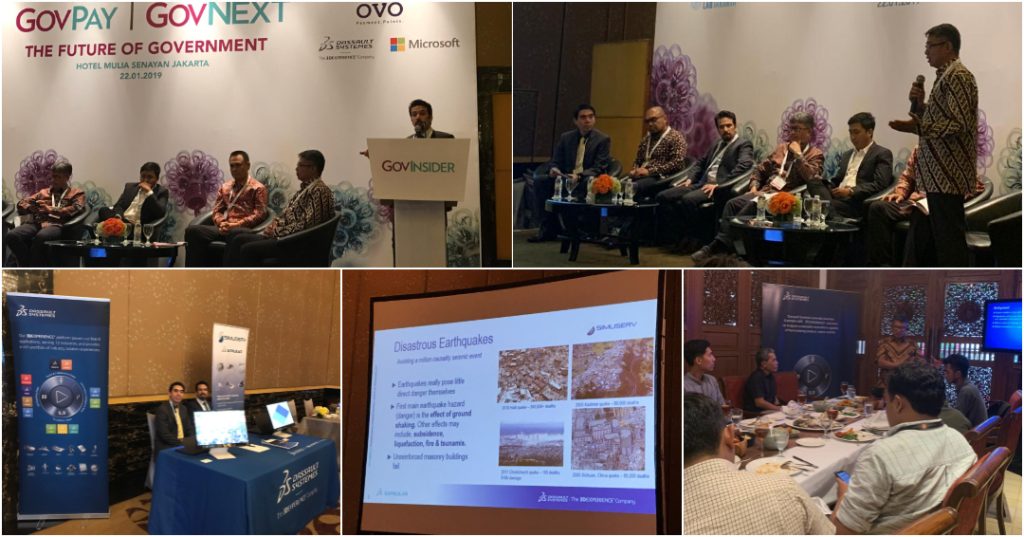Dassault Systèmes was an event partner of the recent GovPay | GovNext Summit in Jakarta on 22 January 2019. Produced by GovInsider with support from the Office of the President of Indonesia, the Summit brought together leading innovators across ASEAN and key decision-makers from Indonesia’s federal, provincial and city governments, to discuss a wide range of topics related to government technology, data analytics and public safety.
Amongst the key topics that attracted significant interest was Disaster Management and Strategies. Adi Aviantoro, Dassault Systèmes’ Country Business Leader, Indonesia Dassault Systèmes, Asia Pacific South, moderated the panel session on Disaster Management and Strategies during the Summit. Dr. Alan Tan, Senior Solution Consultant, Simulia, Dassault Systèmes, was amongst the panelists.
The following is a summary of the discussion points raised during the panel session on the integral role of Disaster Management and Strategies in future smart city planning.
Panel Session: Disaster Management and Strategies – Summary of Discussion

Panellists:
- Mr Eddy Satrya, Deputy Assistant of ICT and Utilities, Coordinating Ministry of Economic Affair RI
- Mr Taufik Hidayat, Assistant for Economy and Development, Lampung Provincial Government
- Mr Roysepta Abimanyu, Advisor (Disaster Management Team Coordinator), The Executive Office of the President
- Mr Sinan Aizad, Senior Mechanical FE Engineer, Simuserv Australia
- Dr Alan Tan, Senior Solution Consultant, SIMULIA, Dassault Systèmes
- Mr Faizal Thamrin, Humanitarian Data Advisor, Pulse Lab Jakarta
Moderator: Mr Adi Aviantoro, Country Business Leader, Indonesia Dassault Systèmes, Asia Pacific South
“Smart city” development has been a focus for governments in the ASEAN region due to two key mega-trends in the region – rapid urban population growth and fast-growing adoption of digital technologies amongst governments, businesses and people.
According to the ASEAN Smart Cities Network, 90 million more people are set to migrate to Southeast Asia’s cities by 2030. Governments around the region have largely expended their efforts on implementing widespread 4G and broadband internet access as a step towards developing “smart cities” to enhance the quality and performance of urban services, such as energy supply, public transportation and waste management, to support rapidly growing urban populations.
However, an area that has often been overlooked is Disaster Management and Strategies in smart city planning. Both man-made and natural disasters, such as earthquakes and severe floods, can potentially result in great economic and human losses that would devastate a city. Disaster management and emergency response mechanisms should therefore be treated as an integral factor for the development of “smart cities”, especially in regions of Indonesia located along the Pacific Ring of Fire prone to natural calamities.
For any effective emergency response system, the first priority is to ensure city residents have access to immediate information on the disaster situation and the steps they can take to secure their personal safety. If people are informed early and given orderly instructions for evacuation, widespread panic can be better mitigated and more lives and property can potentially be saved.
The devastating earthquakes in Sulawesi and Palu have taught us that having a comprehensive disaster management strategy ahead of time is just as important as disaster recovery efforts. Disaster mitigation in Indonesia has taken the spotlight after several major earthquakes hit a number of regions last year. In Palu, for example, experts had previously warned authorities of the possibility of a large earthquake in the region. Perhaps more comprehensive planning could have potentially saved more lives.
How ‘Smart City’ planning can contribute to Disaster Management
This is where ‘smart city’ planning can truly contribute. Dassault Systèmes’ offers city planners ‘smart city’ industry solutions on its 3DEXPERIENCE platform, where 3D virtual replicas for ‘smart city’ concepts can be created and simulated. Through these simulations, city planners benefit from a bird’s eye view of possible scenarios for given problem statements, e.g. evacuation routes for citizens by simulating different scenarios to gauge the best preventive measures to reduce severity of a disaster’s effects, designing a coordinated disaster mitigation plan that efficiently utilizes time and resources.
Such ‘smart city’ planning has the potential to save the maximum number of lives and properties during a disaster, as well as enable continued functionality of the city.
3D technology to simulate disaster situations for better planning
Dassault Systèmes’ ‘smart city’ industry solutions can also leverage historical data and documentation for study and implementation based on past learnings. Because humans are naturally visual and used to navigating the world in 3D, having historical disasters replicated on the 3DEXPERIENCE platform can help geologists and city planners alike to better understand in the virtual environment and prepare for future disasters in the real world.
At the citizen-level, these 3D simulations can also be made accessible through the Internet to help them better understand local governments’ disaster management plans and importantly, be prepared when a disaster strikes.
Dassault Systèmes is working with Indonesian cities to enhance the definition and design of their respective ‘smart cities’. The Padang Pariaman city government, for example, is collaborating with Dassault Systèmes to build a ‘smart city’, which will include planning of emergency response systems in a region prone to natural calamities, such as floods, landslides and earthquakes.
Looking for more insights into Dassault Systèmes’ ‘smart city’ industry solutions? Register for Dassault Systèmes’ 3DEXPERIENCE FORUM 2019 in Thailand.
Event Details: Date: Thursday, 21 March 2019 Time: 9:00am to 6:00pm (Bangkok Time) Venue: The Athenee Hotel, Bangkok, Thailand
